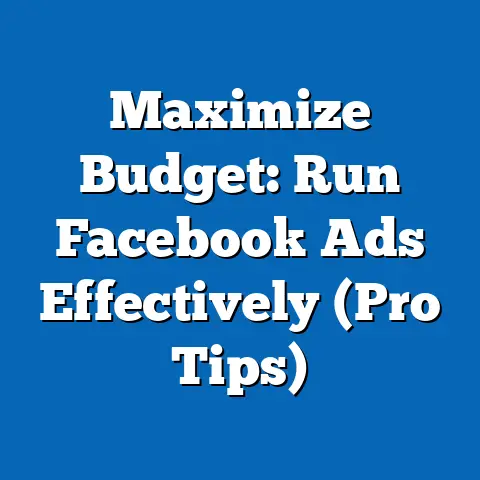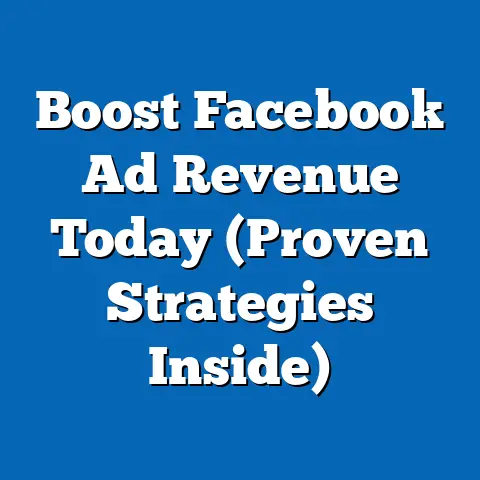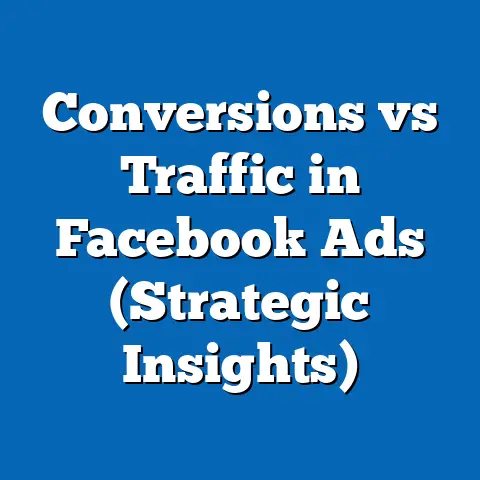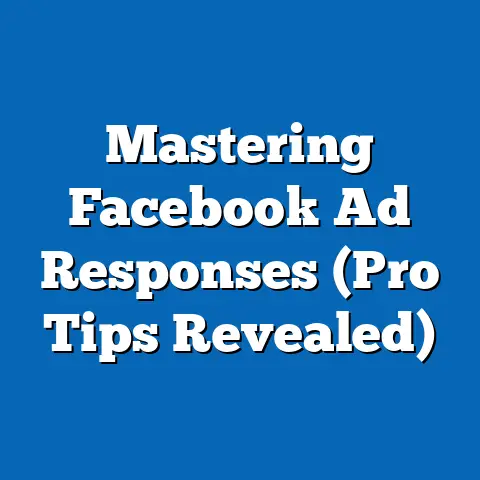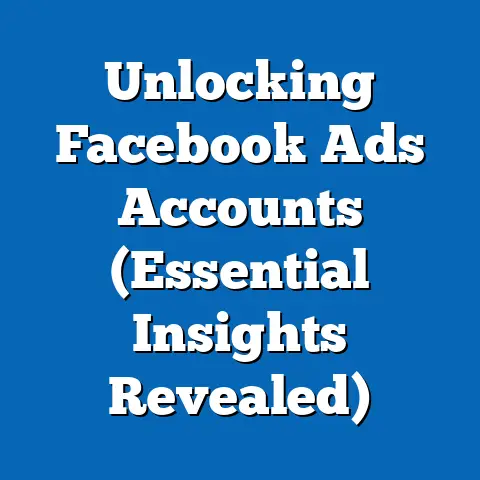Stop Facebook Messenger Ads Now (Expert Tactics Revealed)
Facebook Messenger, once a simple chat app, has morphed into a powerful marketing tool.
I’ve seen countless businesses jump on the bandwagon, lured by the promise of direct communication and seemingly high engagement.
The concept of “layering,” where you stack different advertising methods for maximum impact, has made Messenger ads seem like a no-brainer.
But, after years of running and analyzing campaigns, I’ve come to a stark conclusion: relying heavily on Facebook Messenger ads can be a dangerous game.
While layering strategies are often effective, there are critical reasons why businesses should reconsider their dependence on Facebook Messenger ads specifically.
It’s time to pull back, reassess, and explore expert tactics that will not only save your budget but also protect your brand’s reputation.
Understanding the Current Landscape of Facebook Messenger Ads
Facebook Messenger’s transformation into a marketing platform has been nothing short of remarkable.
We’ve gone from sending casual messages to receiving targeted advertisements, promotional offers, and customer service inquiries.
The Rise of Messenger Marketing
In the early days, Messenger was all about personal connections.
But as businesses realized the potential for direct engagement, it became a prime channel for reaching customers.
The allure is obvious:
- Direct Communication: Messenger allows for one-on-one conversations, creating a sense of personalized attention.
- Higher Open Rates: Compared to email, Messenger boasts impressive open rates, often exceeding 80%.
- Interactive Experience: Features like quick replies and carousels make ads more engaging.
According to Statista, as of 2023, Facebook Messenger has over 1.3 billion active users worldwide.
This massive audience makes it an attractive platform for businesses looking to expand their reach.
I’ve personally seen clients salivate over the potential to tap into such a vast pool of potential customers.
Why Businesses Flocked to Messenger Ads
The promise of Messenger ads is enticing.
Businesses are drawn in by the potential for:
- Increased Conversions: Direct communication can lead to faster conversions, as customers can ask questions and receive immediate answers.
- Improved Customer Service: Messenger bots can handle basic inquiries, freeing up human agents to focus on more complex issues.
- Personalized Marketing: Targeted ads based on user data can deliver highly relevant offers.
I remember one client, a local bakery, who was ecstatic about using Messenger ads to promote their daily specials.
They envisioned a flood of customers rushing in after receiving a mouth-watering photo of a freshly baked cake.
And initially, they saw a surge in sales.
However, the long-term results painted a different picture.
Takeaway: Facebook Messenger offers a direct line to a massive audience, but its potential must be balanced with the risks of over-reliance and potential user fatigue.
The Downside of Facebook Messenger Ads
While the initial appeal of Messenger ads is undeniable, the long-term consequences can be detrimental.
I’ve witnessed firsthand how businesses can fall into the trap of overusing this channel, leading to negative outcomes.
User Fatigue and Ad Blindness
The very feature that makes Messenger ads attractive – direct communication – can also be its downfall.
As users become bombarded with messages from businesses, they develop “ad blindness.” They learn to ignore or filter out promotional content, leading to:
- Decreased Engagement: Open rates plummet as users become more selective about which messages they open.
- Reduced Click-Through Rates: Even if users open a message, they are less likely to click on the call-to-action.
- Increased Unsubscribes: Frustrated users may opt out of receiving messages altogether, shrinking your audience.
I’ve seen this happen with several clients.
Their initial excitement turned to disappointment as their Messenger campaigns yielded diminishing returns.
The once-responsive audience became unresponsive, and the cost per acquisition soared.
The Risk of Being Perceived as Intrusive or Spammy
One of the biggest dangers of Messenger ads is the risk of being perceived as intrusive or spammy.
Users value their privacy and personal space.
When businesses overstep these boundaries, they risk damaging their brand’s reputation.
Consider these scenarios:
- Sending Too Many Messages: Bombarding users with daily promotions can quickly become annoying.
- Using Irrelevant Targeting: Showing ads to users who have no interest in your product or service is a surefire way to alienate them.
- Failing to Provide Value: Sending messages that offer no real benefit to the user is simply a waste of their time.
I recall a particularly cringe-worthy example of a car dealership that sent unsolicited Messenger ads to users who had never expressed any interest in buying a car.
The backlash was swift and severe, with users flooding the dealership’s Facebook page with negative reviews.
Potential for Lower Engagement Rates
As users become more discerning about the messages they open, engagement rates can suffer.
They are more likely to ignore messages that:
- Lack Personalization: Generic, mass-produced messages feel impersonal and irrelevant.
- Are Poorly Written: Messages with grammatical errors or typos create a negative impression.
- Don’t Offer a Clear Value Proposition: Users need to understand why they should care about your message.
I’ve learned that crafting effective Messenger ads requires a delicate balance.
You need to be engaging and informative without being intrusive or annoying.
It’s a constant challenge to stay relevant in a sea of competing messages.
Takeaway: Overusing Messenger ads can lead to user fatigue, negative brand perception, and ultimately, lower engagement rates.
It’s crucial to use this channel strategically and avoid bombarding users with irrelevant or unsolicited messages.
Expert Tactics for Moving Away from Messenger Ads
If you’re starting to see the downsides of relying too heavily on Messenger ads, don’t despair.
There are plenty of expert tactics you can use to shift your focus while maintaining effective communication with potential customers.
Diversifying Communication Channels
The first step is to diversify your communication channels.
Don’t put all your eggs in the Messenger basket.
Explore alternative platforms that can complement or even replace Messenger ads.
- Email Marketing: While Messenger boasts higher open rates, email marketing still offers a powerful way to reach a large audience.
Email allows for more in-depth communication and is less likely to be perceived as intrusive. - SMS Marketing: Text messages have incredibly high open rates and are ideal for sending quick updates or reminders.
However, be mindful of spam regulations and obtain explicit consent before sending SMS messages. - WhatsApp: Similar to Messenger, WhatsApp offers direct communication, but it’s often perceived as more personal and less commercial.
This can be a great option for customer service or building relationships. - Push Notifications: Mobile apps can use push notifications to send targeted messages to users who have installed the app.
This can be a highly effective way to drive engagement.
I’ve helped several clients transition from Messenger ads to a multi-channel approach.
By diversifying their communication channels, they were able to reach a wider audience and reduce their reliance on a single platform.
Creating Value-Driven Content
Content marketing is a powerful alternative to direct advertising.
Instead of pushing products or services, focus on creating valuable content that attracts and engages your target audience.
- Blog Posts: Share informative articles, how-to guides, and industry insights that resonate with your audience.
- Videos: Create engaging videos that showcase your expertise, tell your brand’s story, or entertain your audience.
- Infographics: Visual content is highly shareable and can help you communicate complex information in an easy-to-understand format.
- Podcasts: Audio content is a great way to reach busy listeners who can consume your content on the go.
I’ve found that content marketing is particularly effective for building brand awareness and establishing thought leadership.
By consistently creating valuable content, you can attract organic traffic and build a loyal following.
Leveraging Automation Beyond Messenger
Chatbots and automated systems aren’t limited to Messenger.
You can use them on other platforms to engage users without relying on Messenger ads.
- Website Chatbots: Implement a chatbot on your website to answer common questions, provide product recommendations, or guide users through the sales process.
- Email Automation: Use email automation to send targeted messages based on user behavior, such as welcome emails, abandoned cart reminders, or product recommendations.
- Social Media Automation: Automate your social media posting to ensure consistent engagement and save time.
However, be careful not to over-automate, as it can come across as impersonal.
I’ve seen clients achieve impressive results by using automation to personalize the customer experience.
By providing relevant information and assistance at the right time, they were able to increase conversions and build stronger relationships.
Takeaway: Diversify your communication channels, create value-driven content, and leverage automation beyond Messenger to reduce your reliance on Messenger ads and build a more sustainable marketing strategy.
Case Studies of Brands That Have Stopped Using Messenger Ads
To illustrate the effectiveness of these tactics, let’s examine some real-life examples of brands that have successfully transitioned away from Messenger ads.
Case Study 1: E-commerce Retailer
Challenge: An e-commerce retailer was heavily reliant on Messenger ads to drive sales.
However, they were experiencing declining engagement rates and increasing customer complaints about spam.
Solution: The retailer decided to diversify their communication channels by investing in email marketing and SMS marketing.
They also focused on creating high-quality product videos and blog posts that showcased their expertise.
Results: Within six months, the retailer saw a significant increase in organic traffic and a decrease in customer complaints.
Their email marketing campaigns generated a higher return on investment than their Messenger ads, and their SMS marketing proved to be highly effective for sending flash sale announcements.
Case Study 2: Local Restaurant
Challenge: A local restaurant was using Messenger ads to promote daily specials.
However, they were struggling to attract new customers and were concerned about alienating their existing customer base.
Solution: The restaurant decided to focus on creating value-driven content by sharing recipes, cooking tips, and behind-the-scenes videos on social media.
They also implemented a loyalty program that rewarded customers for repeat visits.
Results: The restaurant saw a significant increase in social media engagement and a surge in new customers.
Their loyalty program proved to be highly effective for retaining existing customers and driving repeat business.
Case Study 3: Software Company
Challenge: A software company was using Messenger ads to generate leads.
However, they were struggling to qualify leads and were wasting time on unqualified prospects.
Solution: The software company decided to implement a website chatbot that asked qualifying questions before routing leads to their sales team.
They also created a series of webinars and white papers that provided valuable information to potential customers.
Results: The software company saw a significant improvement in lead quality and a reduction in sales cycle time.
Their webinars and white papers attracted highly qualified leads who were genuinely interested in their product.
Takeaway: These case studies demonstrate that it is possible to successfully transition away from Messenger ads by diversifying communication channels, creating value-driven content, and leveraging automation.
Future Trends in Digital Advertising
The world of digital advertising is constantly evolving.
To stay ahead of the curve, businesses need to be aware of emerging trends and adapt their strategies accordingly.
The Rise of AI and Machine Learning
Artificial intelligence (AI) and machine learning (ML) are transforming the way businesses advertise.
AI-powered tools can:
- Personalize Ads: Analyze user data to deliver highly relevant ads that resonate with individual users.
- Optimize Campaigns: Automatically adjust bids and targeting parameters to maximize ROI.
- Predict User Behavior: Identify patterns in user behavior to anticipate their needs and preferences.
I believe that AI will become increasingly important in digital advertising, enabling businesses to deliver more effective and efficient campaigns.
The Metaverse and Immersive Experiences
The metaverse is a virtual world where users can interact with each other and with digital content.
As the metaverse becomes more popular, businesses will have new opportunities to advertise and engage with customers.
- Virtual Stores: Create virtual stores where users can browse and purchase products in a 3D environment.
- Interactive Ads: Develop interactive ads that allow users to experience your brand in a unique and engaging way.
- Virtual Events: Host virtual events that bring together your customers and create a sense of community.
I’m excited to see how businesses will leverage the metaverse to create immersive advertising experiences.
The Importance of Privacy and Data Security
As consumers become more aware of privacy issues, businesses need to be transparent about how they collect and use data.
- Obtain Consent: Always obtain explicit consent before collecting or using personal data.
- Be Transparent: Clearly explain your data privacy policies to your customers.
- Protect Data: Implement robust security measures to protect user data from breaches and cyberattacks.
I believe that businesses that prioritize privacy and data security will gain a competitive advantage in the long run.
Takeaway: Stay informed about emerging trends in digital advertising and adapt your strategies accordingly.
Embrace AI and machine learning, explore the metaverse, and prioritize privacy and data security.
Conclusion
Facebook Messenger ads can be a tempting tool, but relying on them too heavily can be a costly mistake.
User fatigue, negative brand perception, and declining engagement rates are just some of the potential pitfalls.
It’s time to reevaluate your approach and explore expert tactics that will not only save your budget but also protect your brand’s reputation.
Diversify your communication channels, create value-driven content, and leverage automation beyond Messenger to build a more sustainable marketing strategy.
Embrace emerging trends like AI and the metaverse, and prioritize privacy and data security.
The future of digital advertising is about building meaningful connections with customers, not bombarding them with intrusive messages.
By adopting a forward-thinking mindset and evolving your marketing strategies, you can connect with your audience in innovative ways and achieve long-term success.

